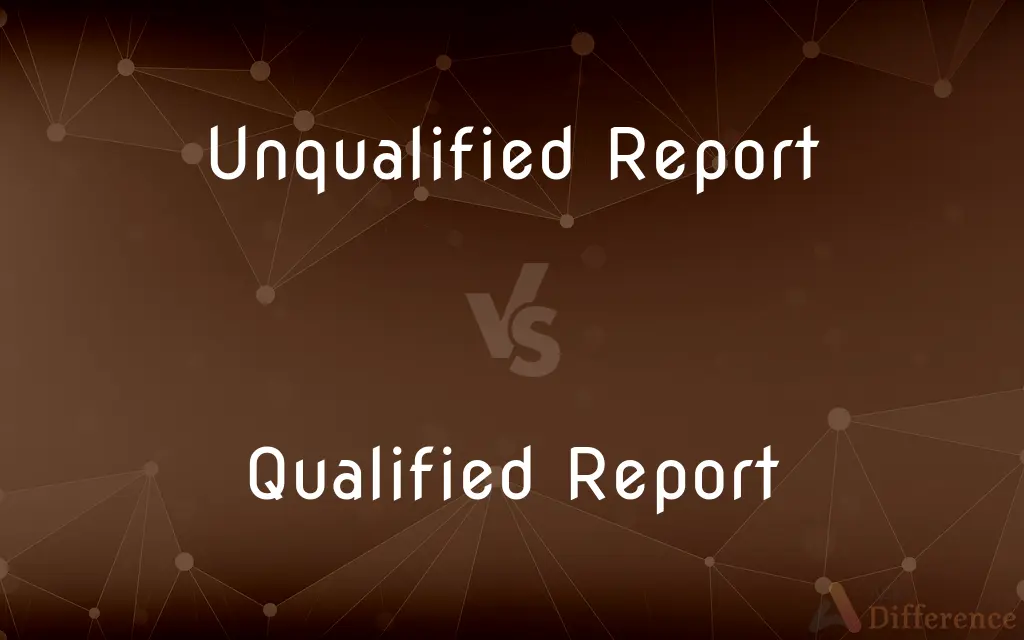Unqualified Report vs. Qualified Report — What's the Difference?
By Tayyaba Rehman — Published on December 23, 2023
Unqualified Report indicates financial statements are fairly presented, while a Qualified Report highlights issues or deviations.

Difference Between Unqualified Report and Qualified Report
Table of Contents
ADVERTISEMENT
Key Differences
An Unqualified Report is an auditor's statement that attests to the fairness and accuracy of a company's financial statements. It suggests that the financials are free from material misrepresentations. On the other hand, a Qualified Report indicates that the auditor has identified certain issues or deviations from standard accounting practices in the financial statements.
The Unqualified Report is often what companies aim for, as it provides stakeholders with confidence in the financial health of the organization. The Qualified Report, however, serves as a red flag that there are certain areas in the financials where the company did not adhere to the generally accepted accounting principles (GAAP) or where the auditor could not obtain sufficient evidence.
Comparison Chart
Nature
Represents fairness and accuracy.
Indicates certain issues or deviations.
Implication
Financials are free from material misrepresentations.
There are areas not adhering to GAAP or insufficient evidence.
Auditor's View
No reservations about financial statements.
Reservations exist about part of the financial statements.
ADVERTISEMENT
Stakeholder's Impact
Provides confidence in financial health.
Serves as a warning or red flag.
Desirability
Preferred by companies.
Not ideal due to the implications it carries.
Compare with Definitions
Unqualified Report
A statement suggesting full compliance with accounting principles and transparency.
The startup's first Unqualified Report was a positive sign for potential investors.
Qualified Report
An auditor's statement indicating reservations about aspects of the financial statements.
The firm's accounts received a Qualified Report due to some inconsistencies.
Unqualified Report
An auditor's opinion indicating financial statements are fairly and accurately presented.
The company received an Unqualified Report, bolstering investor confidence.
Qualified Report
Shows that the auditor could not verify certain financial information.
Due to incomplete documentation, they were handed a Qualified Report.
Unqualified Report
An endorsement of the integrity of financial statements without any reservations.
Their consistent Unqualified Report proved the reliability of their financial practices.
Qualified Report
Less than ideal auditor's statement due to reservations about the financials.
Despite their best efforts, the discrepancies led to a Qualified Report.
Unqualified Report
The best type of report a company can receive from its auditors.
Achieving an Unqualified Report was the CFO's primary goal for the fiscal year.
Qualified Report
An opinion suggesting the possibility of material misrepresentation in parts of the financials.
The Qualified Report drew attention to the company's questionable revenue recognition practices.
Unqualified Report
An affirmation that financial records are devoid of material misrepresentations.
An Unqualified Report is a testament to the company's meticulous financial record-keeping.
Qualified Report
Indicates issues or non-compliance with standard accounting practices.
A Qualified Report often points investors towards areas needing more scrutiny.
Common Curiosities
What issues can lead to a Qualified Report?
Non-compliance with standard accounting practices, or areas where the auditor couldn't verify information can lead to a Qualified Report.
What does an Unqualified Report signify?
An Unqualified Report signifies that the financial statements are fairly and accurately presented without any material misrepresentations.
What should investors do if they see a Qualified Report?
Investors should carefully review the issues raised in the Qualified Report and assess their potential impact.
How can a company move from a Qualified to an Unqualified Report?
Addressing and resolving the highlighted issues in the Qualified Report can help a company achieve an Unqualified Report in the future.
Is an Unqualified Report better than a Qualified Report?
Yes, an Unqualified Report is generally seen as more favorable as it indicates transparency and adherence to accounting standards.
Is it common for companies to receive a Qualified Report?
While it's not rare, companies usually strive for an Unqualified Report as it's more favorable.
Are there other types of audit reports besides Unqualified and Qualified Reports?
Yes, there are also "Adverse" and "Disclaimer of Opinion" reports, each with different implications.
Can a Qualified Report impact a company's stock price?
Yes, a Qualified Report can negatively affect investor confidence, potentially impacting the stock price.
Can an Unqualified Report have footnotes or clarifications?
Yes, an Unqualified Report can still have footnotes that provide additional context or clarifications.
Is an Unqualified Report a guarantee of a company's financial health?
While it's a positive sign, investors should still conduct their due diligence and not solely rely on it.
Can a company challenge a Qualified Report?
While a company can discuss concerns with auditors, the auditor's independent judgment is final.
Who decides if a report is Unqualified or Qualified?
The company's external auditors make this decision based on their examination.
Does a Qualified Report always indicate wrongdoing?
No, it indicates areas of concern or non-compliance, not necessarily wrongdoing.
How often are audit reports like the Unqualified and Qualified Reports issued?
Typically, they are issued annually as part of a company's annual report.
Are Unqualified and Qualified Reports international standards?
Yes, they are recognized concepts in international auditing standards, though exact terminology might vary by country.
Share Your Discovery

Previous Comparison
Myelinated Nerve Fibers vs. Unmyelinated Nerve Fibers
Next Comparison
LAN vs. Wi-FiAuthor Spotlight
Written by
Tayyaba RehmanTayyaba Rehman is a distinguished writer, currently serving as a primary contributor to askdifference.com. As a researcher in semantics and etymology, Tayyaba's passion for the complexity of languages and their distinctions has found a perfect home on the platform. Tayyaba delves into the intricacies of language, distinguishing between commonly confused words and phrases, thereby providing clarity for readers worldwide.













































